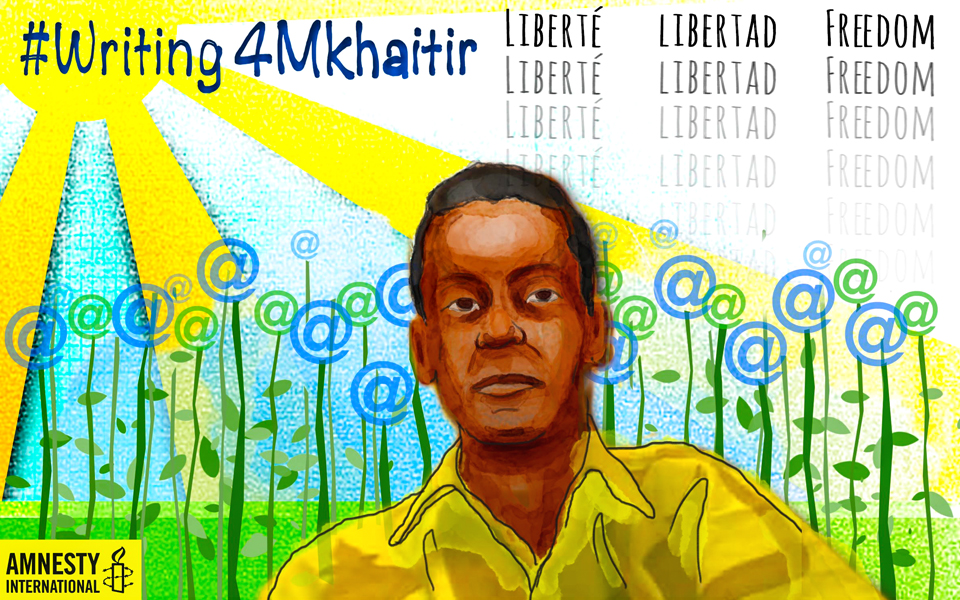Amnesty International, Human Rights Watch, Freedom Now, the Forum des organizations nationales des droits de l’Homme en Mauritanie and 28 other human rights groups issued a statement today demanding the Mauritanian authorities to immediately release the blogger Mohamed Cheikh Ould Mkhaïtir, 35, who still under detention in an undisclosed location despite the Court of Appeal’s decision abolished the death sentence one a year ago.
“Detention of a prisoner of conscience like Mohamed Mkhaïtir is a fragrant contempt for the rule of law by the Mauritanian authorities which solely detain him because he peacefully exercised his right to freedom of expression,” said Kine Fatim Diop, Amnesty International’s West Africa Campaigner.
“Blogging is not a crime, and he must be released immediately and unconditionally according to the Mauritanian court’s decision and the authorities should follow all available means to guarantee his safety”, he added.
Mkhaïtir was arrested by the Mauritanian authorities for the first time on 2 January 2014 after he published a blog in December 2013 in which criticized all forms of slavery and discrimination, including against the blacksmith caste, which he belongs to.
Mass protests calling for Mkhaïtir’s execution for ’blasphemy’- one of which the Mauritanian President addressed sympathetically– broke out all over the country following the publication of the blog.
On several occasions during his interrogation by police and in a written statement dated 11 January 2014, Mkhaïtir declared his ‘repentance’ before he was tried on 23 December 2015 and sentenced to death the following day with charges of apostasy and insulting the Prophet Muhammad.
On 9 November 2017, an appeal court commuted his death sentence to two years in prison, which he had already served, and a fine. In March 2018, the Mauritanian Minister of Justice Mokhtar Malal Dia said in an interview that “the blogger Mkhaïtir is still held somewhere in Mauritania’’.
Later on, the Mauritanian authorities informed the UN Committee on the Elimination of Racial Discrimination in May that Mkhaïtir was in “administrative detention for his own safety”.
For almost a year, his lawyers have repeatedly asked for his visit, but have yet to receive a reply from the Minister of Justice. Mkhaïtir is now believed to be in an urgent need for medical care.
“Instead of respecting the court order, the authorities keep refusing to disclose the place of his detention and continue preventing him from contacting the outside world,” said Fatimata Mbaye, human rights defender and Mkhaïtir’s domestic lawyer.
“This is a series incommunicado detention and a fragrant violation of human rights. The authorities must end this arbitrary detention, immediately release him and ensure his safety”, she added.
On several occasions, the United Nations has criticized the detention and trial of Mohamed Mkhaïtir. In June 2017, the United Nations Working Group on Arbitrary Detention concluded that Mkhaïtir’s trial was unfair, that his detention was arbitrary and that Mauritania has violated international law.
In May 2018, six UN human rights experts expressed deep concerns over the continued detention of the Mauritanian blogger.
“This case is a realistic embodiment of the Mauritanian government’s repression of freedom of expression and information, especially against human rights defenders who campaign against discrimination, and journalists covering the illegal use of forced labor,” said Kate Barth, Freedom Now Legal Director.”
“Mauritania must immediately and unconditionally release Mkhaïtir. It should also put an end to the imprisonment of people who peacefully express their opinions”, she added.
BACKGROUND
Article 306 of the Criminal Code was replaced on April 2018 by the Mauritanian National Assembly. The amended makes the death penalty mandatory for anyone convicted of “blasphemous speech” and other acts regarded as “sacrilegious”.
The new legislation provides for the non-possibility of replacing the death penalty with imprisonment for certain apostasy-related crimes even if the offender promptly repents.
It also broadens the scope of application of the death penalty to “renegade acts.” It worth noting that the enactment of the law was just few months after the court of appeal ordered Mkhaïtir’s release, apparently to be related to his case.
Mauritania is already a party to several international human rights treaties, including the International Covenant on Civil and Political Rights, the Convention against Torture and the African Charter on Human and Peoples’ rights that protect the right to life.
The death penalty is regarded as inhuman and degrading punishment.
The UN Human Rights Committee said that it will investigate Mauritania’s commitment to the International Covenant on Civil and Political Rights in 2019.







